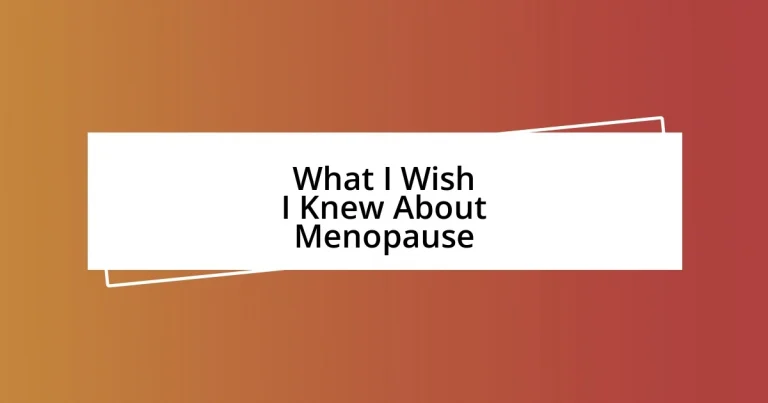Key takeaways:
- Menopause is a unique transition for each woman, marked by physical and emotional changes due to hormonal shifts, highlighting the importance of open discussions and community support.
- Common symptoms include hot flashes, mood swings, sleep disturbances, and memory issues, which can be disconcerting but are shared experiences among many women.
- Effective management of menopause can include a healthy lifestyle, hormone replacement therapy, herbal supplements, and support resources like community groups and literature that provide understanding and empathy.
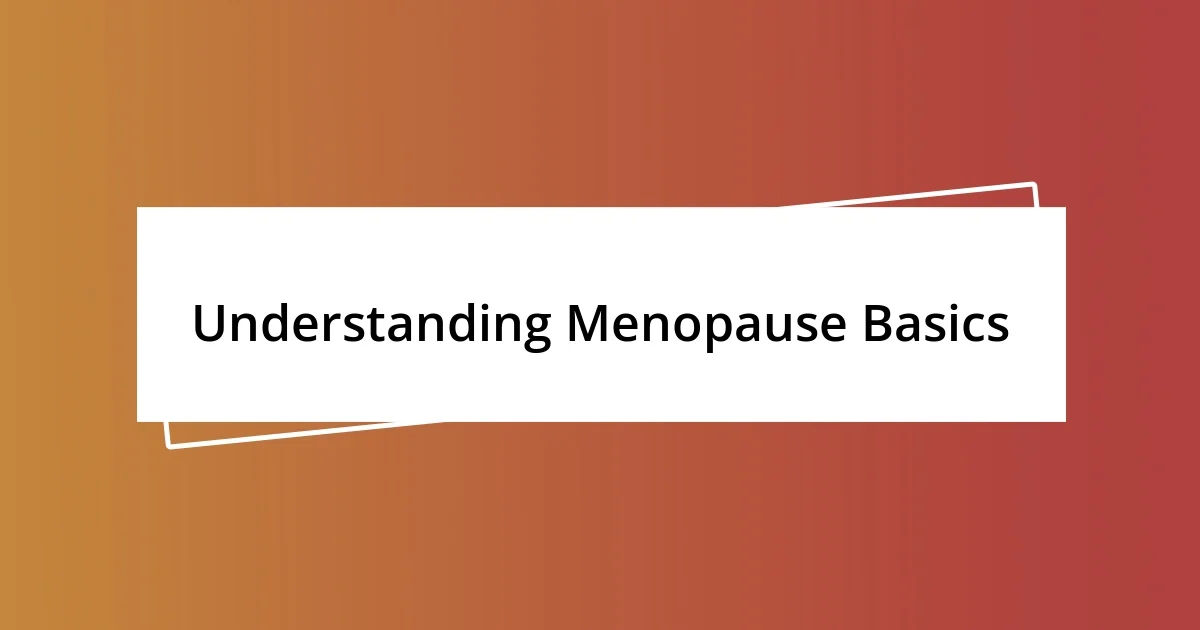
Understanding Menopause Basics
Menopause marks a significant transition in a woman’s life, typically occurring between the ages of 45 and 55. I remember when I first heard the term, I thought it was just about hot flashes and mood swings. But understanding menopause is much deeper; it signifies the end of menstrual cycles and a shift in hormone levels, which can lead to various physical and emotional changes.
Experiencing menopause can feel like navigating a maze without a map. I vividly recall my friend sharing her confusion about the myriad symptoms she faced. One moment, she’d be comfortable, and the next, she’d be overwhelmed by anxiety. It’s crucial to realize that each woman’s journey through menopause is unique, influenced by genetics and personal health history.
As I delved deeper into this subject, I began to appreciate the importance of open conversations about menopause. Have you ever felt isolated while dealing with personal changes? That sense of loneliness can often be exacerbated by a lack of understanding around menopause. Embracing discussions and sharing experiences can be incredibly empowering, creating a community of support for what is often perceived as a taboo topic.
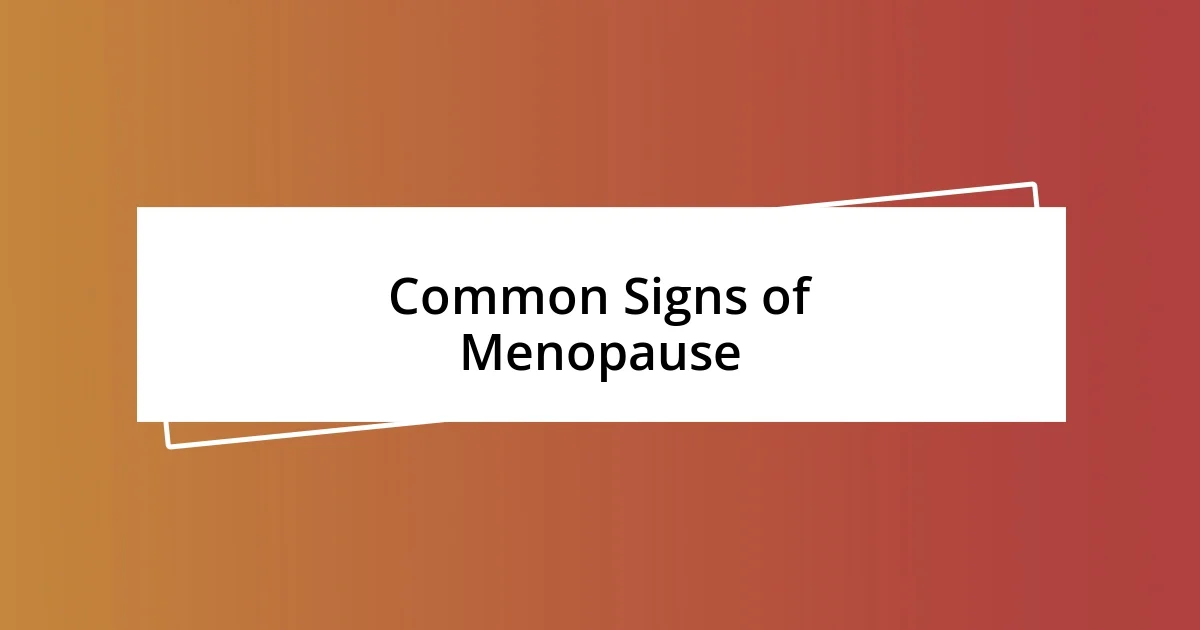
Common Signs of Menopause
Menopause often brings with it a variety of common signs that can catch many women off guard. I distinctly remember the first time I experienced a hot flash; it felt like being engulfed in sudden flames, making me realize that these physical changes can be quite startling. Alongside this, mood swings became an unwelcome companion, transforming minor irritations into emotional thunderstorms.
One of the more perplexing symptoms for me was the trouble with sleep. I used to cherish my nights of peaceful slumber, but suddenly, sleeplessness crept in like an uninvited guest. Those restless nights left me exhausted during the day, compounding the overall feelings of irritability and emotional instability. Have you ever found yourself tossing and turning, wondering if anyone else feels this way? I learned that this battle with sleep is a common experience, often intertwined with hormonal shifts during menopause.
It’s fascinating to note that memory issues can also emerge, which struck a chord with me on several occasions. I would walk into a room only to forget why I was there. Each time this happened, I couldn’t help but chuckle at the absurdity of it all. Sharing these experiences with friends made me realize I’m not alone; many women experience what is often referred to as “brain fog” during this time. These shared stories became a mutual source of solace, making menopause feel a little less daunting.
| Common Signs | Description |
|---|---|
| Hot Flashes | Sudden feelings of warmth, often accompanied by sweating and flushing, typically affecting the face and neck. |
| Mood Swings | Rapid changes in mood, where emotions can fluctuate dramatically, often from joy to irritation. |
| Sleep Disturbances | Difficulty falling asleep or staying asleep, leading to feelings of fatigue and irritability during the day. |
| Memory Issues | Challenges with concentration or recall, often described as “brain fog”. |
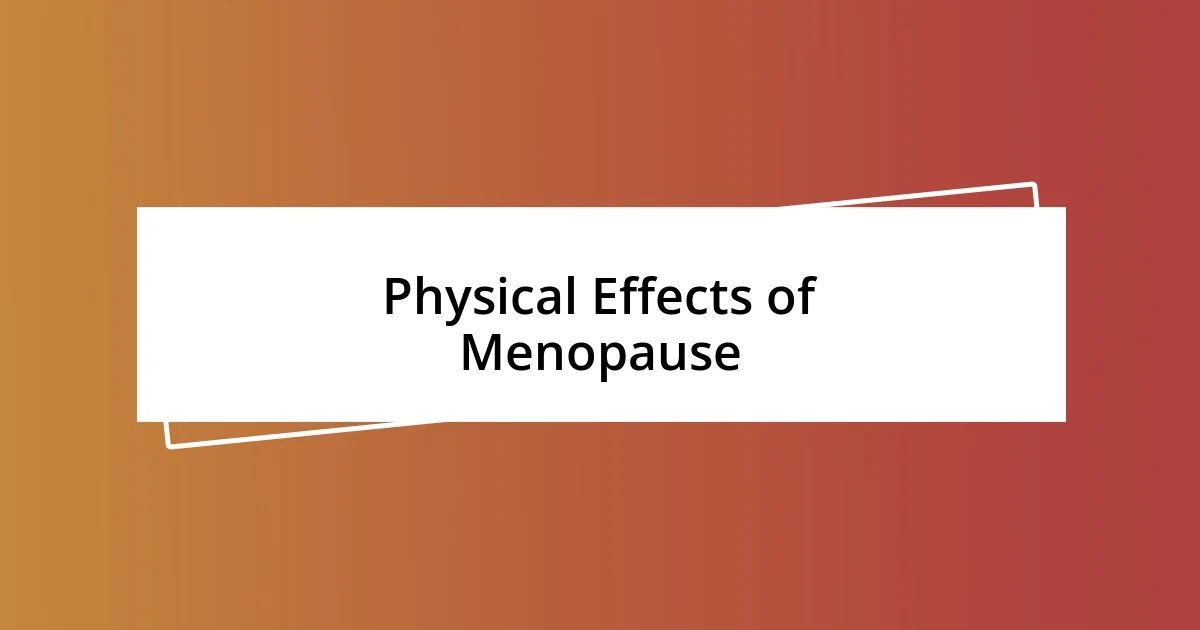
Physical Effects of Menopause
I often felt like my body was playing a cruel joke on me during menopause. One of the most disconcerting changes was the sudden weight gain. I had always maintained a healthy lifestyle, but I started to notice that my clothes fit differently, no matter how many salad bowls I filled. This unexpected shift often left me frustrated and self-conscious, as if my body was betraying me in ways I hadn’t anticipated.
Here’s a closer look at some physical effects I observed during this transition:
- Weight Gain: Many women find that they gain weight, especially around the abdomen, regardless of diet and exercise.
- Joint Pain: I began experiencing occasional aches in my knees and hands, making simple activities more challenging.
- Skin Changes: My skin became drier and less elastic, which was surprising to see in the mirror.
- Fatigue: There were days when I felt an overwhelming sense of tiredness, even after what should have been a restful night.
As I talked to other women, it became clear that fatigue was another common thread. I used to be full of energy, easily bouncing from one activity to another, but suddenly, I was hitting a wall by mid-afternoon. It was like walking through molasses. On days when I found myself yearning for a nap, I remember looking out the window and feeling a mixture of frustration and acceptance. It can be comforting to know that while these physical changes are undoubtedly challenging, they are also part of a broad spectrum of experiences shared by many women.
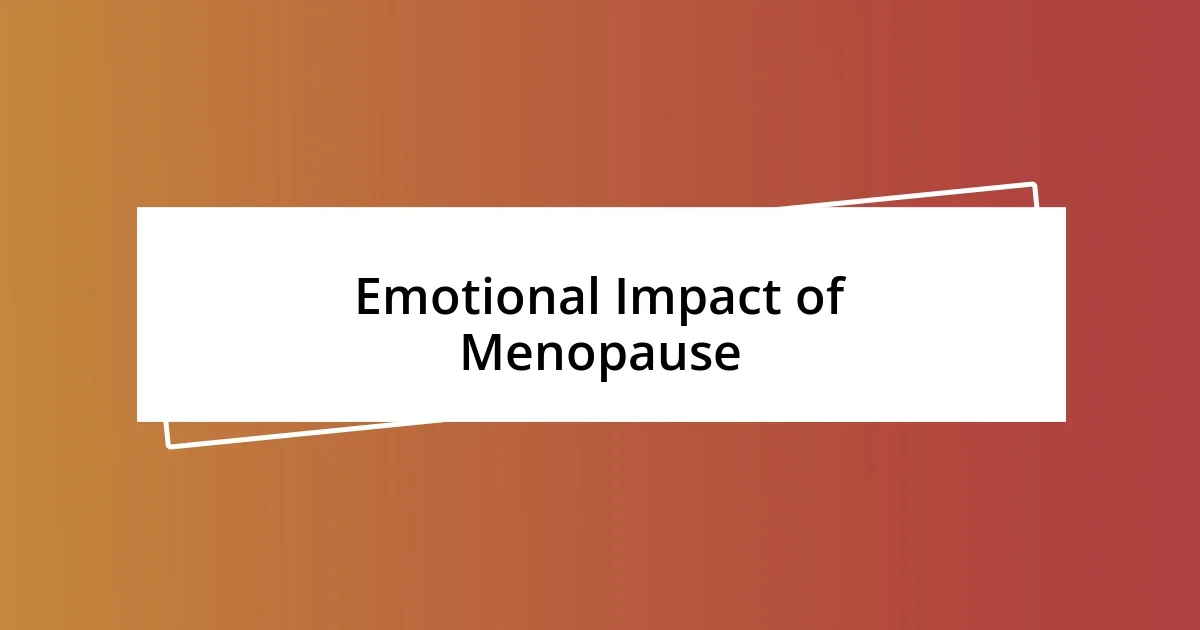
Emotional Impact of Menopause
Menopause can feel like an emotional roller coaster, and I certainly didn’t expect it to be such a wild ride. One day, I would feel overwhelmed with sadness, and the next, I would be filled with inexplicable joy—sometimes within the same hour! Have you ever been in a situation where the smallest thing made you cry? I found myself tearing up over commercials, which felt so foreign to me. It was as if my emotions were no longer under my control, leading me to seek out ways to find balance amid the chaos.
Another layer of emotional impact came from feelings of isolation. I often felt like I was entering a strange new world that my friends and family didn’t quite understand. I remember sharing my experiences with a close friend, who was genuinely supportive but hadn’t gone through menopause yet. This disconnect made me realize that sometimes we just want others to “get it.” Finding a community of women who share similar stories and struggles made all the difference for me. It was comforting to know that we could uplift one another through this transition, turning what felt like a solitary journey into a shared one.
As I navigated through these emotional tides, I found myself reflecting on the importance of self-compassion. In moments of frustration, I often reminded myself that it’s okay to feel all these emotions. Allowing myself to experience anger, sadness, or even confusion without judgment was liberating. I began practicing mindfulness techniques, which helped me embrace my feelings rather than avoid them. Have you ever tried just sitting with an emotion to understand it better? It’s amazing how acknowledging your feelings can lead to a greater sense of peace and resilience, making the menopause journey more manageable.
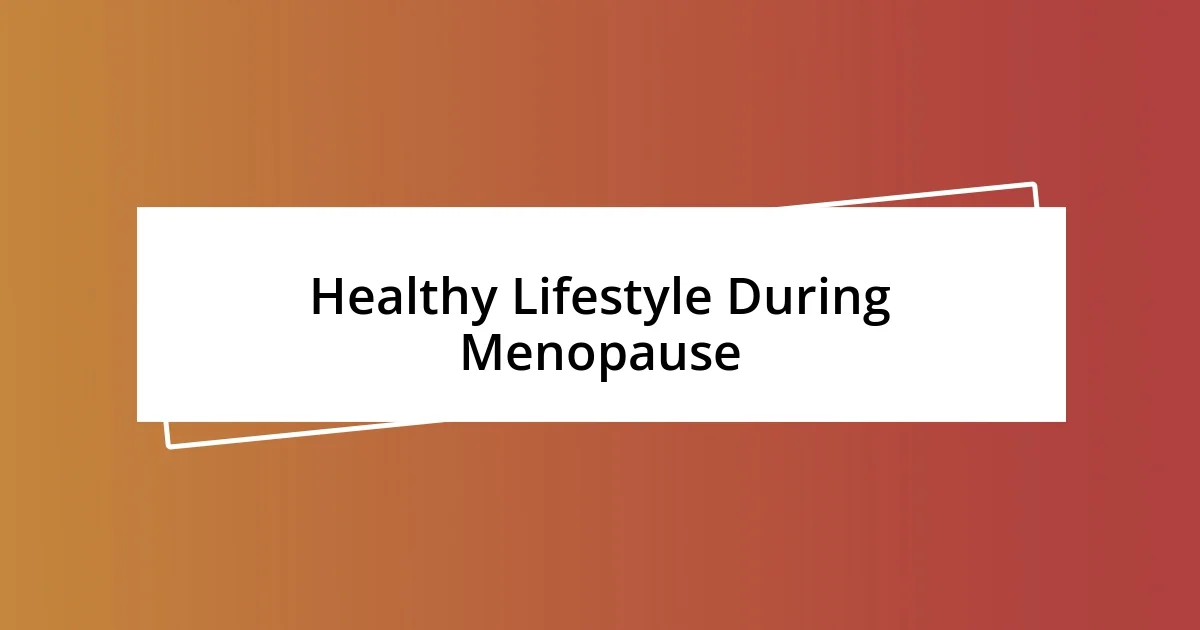
Healthy Lifestyle During Menopause
Embracing a healthy lifestyle during menopause became my anchor in the storm of physical and emotional changes. I discovered that maintaining a balanced diet, rich in whole foods, made a tangible difference in my energy levels and overall mood. Have you ever felt the difference when you swap a sugary snack for fruit? I definitely did. A simple apple or some hummus with veggies fueled me better than I expected.
Exercise also proved to be a game-changer for me. Initially, I thought about sticking to my usual routines—like yoga and brisk walking—but I realized I needed to adapt as my body changed. So, I tried strength training, which not only built muscle but also helped alleviate some of the joint pain I was experiencing. There were days when I’d step into the gym feeling sluggish, but I always left feeling accomplished and, dare I say, energized. You might be surprised at how a little movement can lift both your mood and spirits.
And let’s not forget about the importance of hydration and sleep! I noticed that when I prioritized drinking water and setting a consistent sleep schedule, I felt more balanced. Have you noticed how even a little bit of deprivation can throw you off your game? I certainly did. It’s all interconnected; when I respected my body’s needs, I’d find myself navigating menopause with a little more grace, despite the challenges.
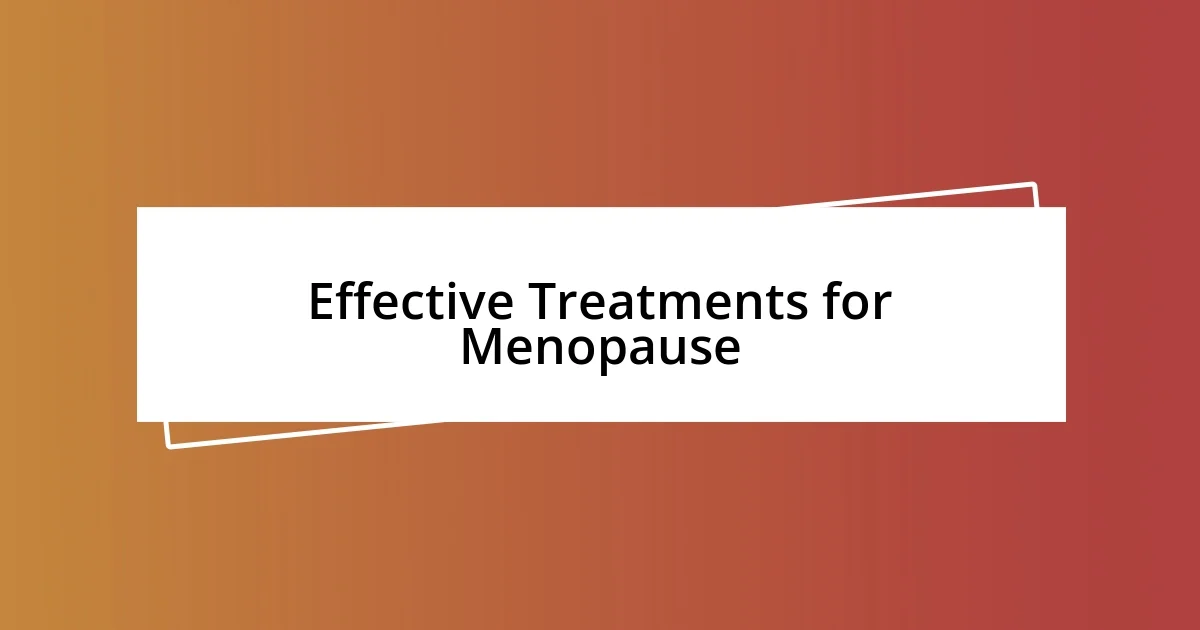
Effective Treatments for Menopause
When exploring effective treatments for menopause, hormone replacement therapy (HRT) often comes to mind. I remember grappling with the decision of whether to try it. It felt daunting, but after discussing it with my doctor and weighing the risks and benefits, I found that HRT significantly eased my hot flashes and night sweats. Have you ever found a solution that felt like it changed everything for you? For me, it was like regaining control over my body.
Aside from HRT, there are alternative treatments like herbal supplements that many women, including myself, have found beneficial. I tried black cohosh, which was recommended by a friend. To my surprise, it offered some relief from mood swings and irritability. It’s fascinating how nature can offer support during such a tumultuous phase, but I always advise talking to a healthcare provider before diving into herbal remedies. What works for one person may not always be the right fit for another!
Additionally, cognitive-behavioral therapy (CBT) proved invaluable for managing anxiety related to menopause. I initially went in thinking it would just be talking through my feelings, but it turned out to be much more than that. The structured techniques helped me reframe negative thoughts and cope with stress more effectively. Have you experienced a breakthrough in understanding your emotions? There was something liberating about recognizing those feelings and knowing I had tools to manage them better.
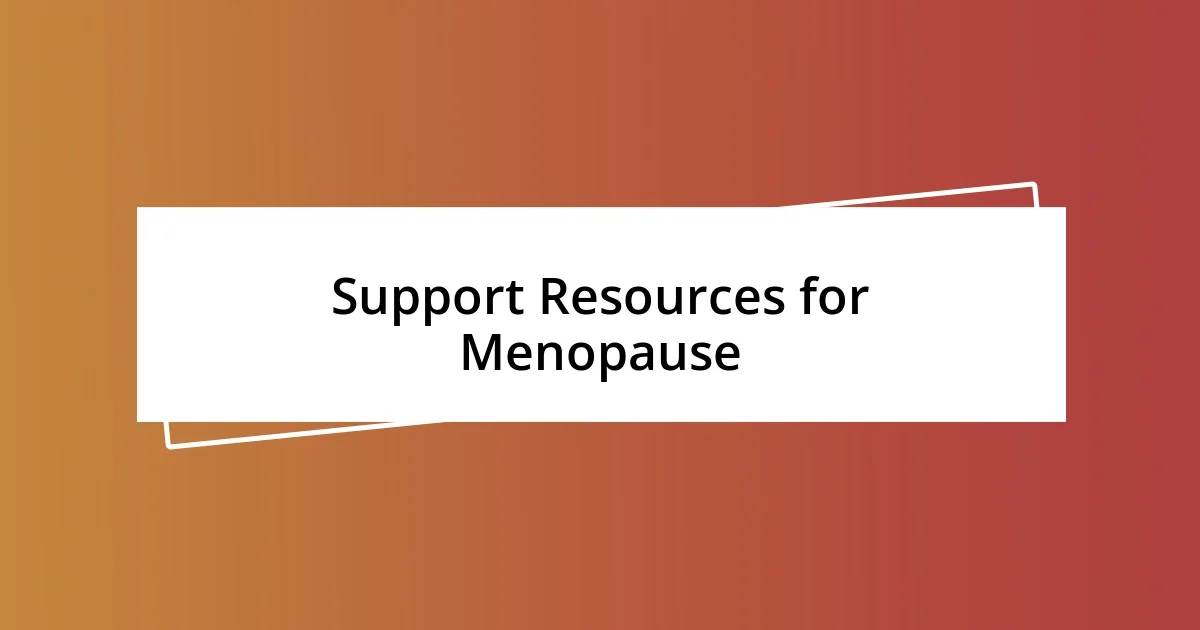
Support Resources for Menopause
Finding support resources during menopause can often feel overwhelming, but I found community to be incredibly reassuring. I remember attending a local support group at a community center, where women shared their experiences and advice. It was a revelation to realize I wasn’t alone, and hearing diverse stories made me feel embraced in a sisterhood of understanding. Have you ever felt the relief that comes from connecting with others facing similar challenges? I certainly did—those shared laughs and tears turned my perspective around.
Online platforms have also played a vital role in my journey. Websites dedicated to menopause, like forums and social media groups, created a space to ask questions and share tips without judgment. I discovered some fantastic resources where experts offered workshops and webinars on coping strategies that I never knew existed. It’s amazing how a few clicks can catapult you into a wealth of knowledge and support. Have you ever felt lost in a sea of information, only to find a gem of wisdom that made everything clearer? That’s been my experience!
Additionally, I sought out literature that resonated with me on a personal level. For instance, I found a book that tackled menopause with humor and realism—it’s so refreshing to read material that doesn’t sugarcoat the experience. Engaging with literature not only educated me but also provided reassurance that it’s okay to laugh about the ups and downs. Each chapter felt like a conversation with a friend, which is something I deeply appreciated during those tumultuous times. What books or resources have you turned to that helped shape your understanding of menopause? I’d love to hear about them!











